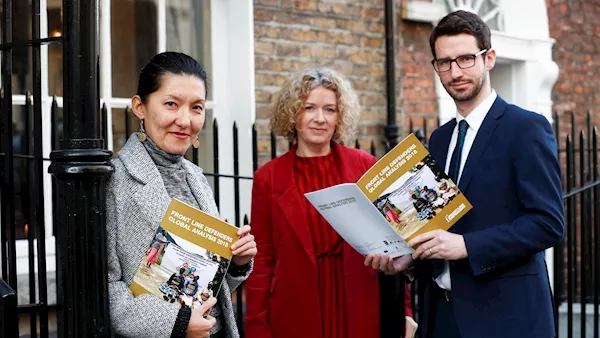Last year was the deadliest on record for human rights activists with at least 321 murdered and many hundreds more assaulted, detained or disappeared.
While most of the attacks took place in a small group of countries with persistently poor human rights records - Colombia and Mexico in particular - concerns are also being raised about a spate of new laws in other countries which, it is feared, will make activists more vulnerable.

Meerim Ilyas, Deputy Head of Protection, Front Line Defenders, Caitriona Rice, head of grants, Front Line Defenders and Ed O’Donovan, head of protection, Front Line Defenders. Picture Conor McCabe Photography.
Among the countries intensifying action against human rights workers through oppressive new laws on protest, public comment and activism are Hungary, Brazil, Vietnam, Bangladesh, Egypt, Turkey, Tanzania, Oman and Nicaragua.
The grim assessment of the growing threats to human rights workers is presented by Irish charity, Front Line Defenders, in its latest annual Global Analysis report.
It stresses that the statistics it has compiled - 321 killings and 623 other violations - are just a portion of the true picture as they only represent the cases notified to the charity and where those involved were comfortable to be publicly recorded.
"Human rights norms are being challenged all over the world," said Ed O'Donovan, Front Line Defenders head of protection.
"It is more important than ever that governments who value human rights lend vocal, practical and financial support to the work of these peaceful activists who are fighting against a tide of xenophobia, racism, homophobia, misogyny and environmental degradation."
Of the 321 recorded killings in 2018 - nine more than in 2017 - 126 took place in Colombia, 48 in Mexico, 39 in the Philippines, 26 in Guatemala, 23 in Brazil, 19 in India and smaller numbers in 21 other countries.
Most at risk were those working to assert land rights, to protect the environment or champion indigenous peoples. Half of those killed had previously received a direct threat to their life while most others had suffered harassment, general threats, physical attacks and intimidation.
Front Line Defenders tries to build protections around activists under threat, providing practical support such as communications and security equipment, legal representation, advocacy and 'visibility campaigns' that seek to garner public support.
"In the vast majority of cases, human rights defenders did not receive the necessary protection and support from state authorities from the time they reported threats to the time they were murdered," the charity said.
Most of the murdered were men, with 12% of them women, but women faced particular patterns of abuse and intimidation including sexual assault and rape, harassment of their children, removal from high-ranking positions in public life and smear campaigns questioning their commitment to their families.
In some cases, they are turned on by others within their own human rights movements who come to consider them as bringing too much negative attention to an organisation.
Despite the risks and the barriers they faced, human rights defenders recorded notable successes last year, the report shows. Among them was the restoration of democracy in the Maldives after a concerted effort by NGOs and human rights workers to oppose the previous authoritarian regime.
Campaigners were also credited with the decision in Malaysia to abolish the death penalty.






